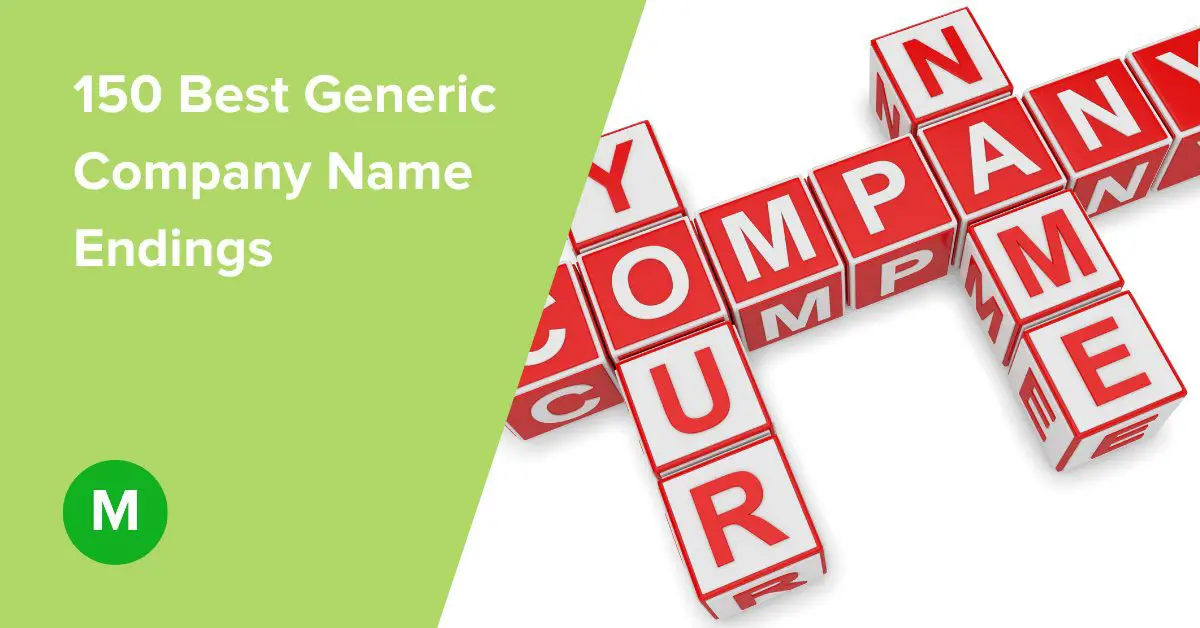150 Best Generic Company Name Endings
A company name should reflect the image and values of the company.
The ending of your company name is just as important as the beginning. Choosing a name ending that conveys the right message is essential.
There are a few different ways to approach this.
You can go with something straightforward and generic that represents your industry or get creative and use a play on words.
In either case, your goal is to choose a name that will be memorable, professional, and business-friendly and help you stand out from the crowd.
- Generic Business Name Ending Ideas
- What can I put at the end of a business name?
- What are generic company suffixes?
- What company suffix should I use?
- What is a business suffix?
- Can I put “company” at the end of my business name?
- What words cannot be used in a business name?
- Company suffixes by country
- Company name ending with associates
- Wrap Up
Here are some of the company name endings to consider for your business:
Generic Business Name Ending Ideas
A generic business name is a name that is not specific to any particular product or service. It is simply a name that any business can use.
Generic company name endings are often used by businesses that offer a variety of products or services, as they allow the business to be easily found by potential customers.
When choosing a generic business name ending idea, it is vital to choose a name that is easy to remember and spell.
Avoiding names that are too similar to other businesses in your industry.
Here are some common generic industry ideas:
Business Services
Consulting/Consultants
Financial Services
Capital
Equity
Investments
Technologies
Communications
Media
Manufacturing
Industries
Holdings
Collective
Logistics
Transportation
Direct
Labs
Agency
Foodstuffs
Brothers
Productions
Entertainment
Group
Associates
Ventures
Properties
Direct
Prestige
Solutions
Research
Securities
Energy
Conservation
Water
Engineering
Developments
Design
Public Relations
Architecture
Construction
Building
Maintenance
Inspection
Repairs
Cleaning
Consulting
Planning
Management
Systems
Integration
Support
Training
Education
Publishing
Marketing
Advertising
Publicity
Events
Promotions
Entertainment
Hospitality
Travel
Leisure
Sports
Recreation
Fitness
Wellness
Beauty
Personal Care
Home
Garden
Landscaping
Furnishings
Appliances
Shopping
Gifts
Retail
Wholesalers
Banking
Credit
Arts
Fashion
Film
Music (Productions)
Photography
Web
Computers
Hardware
Software
Gaming
Internet Services
Telecommunications
Publishing
In many cases, a generic name can be just as successful as a brand name.
It all comes down to your marketing strategy and how you position your business in the market.
Even a generic name can become a household name if you have a strong branding strategy.
What can I put at the end of a business name?
Below are some standard legal business entity designations used at the end of a business name.
S Corp: An S corporation is a special corporation elected to be taxed under Subchapter S of the Internal Revenue Code. This allows the business to pass income, losses, and other tax items to the shareholders, who then report them on their personal tax returns.
C Corp: A C corporation is the most common type of corporation. Separate and distinct from the owners, it is a legal entity. This means the business can enter into contracts, own property, and engage in business activities in its name.
B Corp: A B corporation is a for-profit company that has been certified by the nonprofit B Lab to meet specific standards of social and environmental performance, accountability, and transparency.
LLC: An LLC combines a partnership’s freedom with a corporation’s limited liability protection.
Nonprofit: A nonprofit organization is an organization that the IRS has granted tax-exempt status. This status allows the organization to exempt itself from certain taxes, such as income tax.
PLLC: A professional limited liability company is a type of LLC owned by one or more professionals, such as lawyers, doctors, or accountants.
LLP: In a limited liability partnership, the partners are not held personally responsible for the debts and obligations of the business.
PC: A professional corporation is a type of corporation that is owned by one or more professionals, such as lawyers, doctors, or accountants.
Now that you know some of the different designations used for businesses, you can decide what to put at the end of your business name.
What are generic company suffixes?
Company suffixes are added to the end of a company’s name and are typically used to indicate the company’s legal status or ownership structure. The most common company suffixes are “Inc.” and “LLC.” Other common suffixes include “Co.” and “Corp.”
Suffixes can help determine a company’s size, industry, geographic location, and business model. For example, a company with the suffix “Inc.” is likely to be a publicly-traded corporation. In contrast, a company with the suffix “LLC” will likely be a privately-held limited liability company.
While suffixes are not required in all cases, they can help provide clues about a company. Therefore, when researching a potential business partner or investment, it can be helpful to pay attention to company suffixes as part of your due diligence.
What company suffix should I use?
The choice of company suffix will depend on various factors, such as the type of business you are running, your business structure, and your geographic location.
If you are starting a business in the United States, the most common suffixes are “Inc.” for a corporation or “LLC” for a limited liability company.
If you are starting a business in Canada, the most common suffixes are “Corp.” for a corporation or “Inc.” for an incorporated company.
In the United Kingdom, the most common suffixes are “PLC” for a public limited company or “Ltd” for a private limited company.
Many other company suffixes are available, and the best choice for your business will depend on your specific circumstances. Again, you should consult an attorney or accountant to determine which suffix is right for you.
What is a business suffix?
A business suffix is a string of characters appended to the end of a company’s name that identifies the company’s legal status.
The most common business suffixes are “Inc.” and “LLC.” Other common business suffixes include “Corp.,” “Limited,” and “Co.”
The business suffix you choose for your company will depend on the business structure you have chosen for your company. For example, if you have formed a corporation, you need to use the suffix “Inc.” On the other hand, if you have formed a limited liability company (LLC), you will need to use the suffix “LLC.”
Choosing the right business suffix is essential because it can impact how potential customers and partners perceive your company. It can also affect the legal protections of your company and its shareholders.
Can I put “company” at the end of my business name?
If you’re wondering whether you can put “company” at the end of your business name, the answer is yes. Doing so can benefit your business since it signals to potential customers that you’re a professional and credible organization.
Additionally, including “company” in your business name can help you stay compliant with state and federal regulations.
When it comes to naming your business, there are a lot of factors to consider. Signaling that you’re a professional and credible company is one of the main benefits of putting “company” at the end of your business name.
Having “company” in your name can give off the idea that your company is well-established, which increases the likelihood that customers will do business with you.
In addition to conveying a sense of professionalism, using “company” in your business name can also help you stay compliant with state and federal regulations. In some cases, businesses must include “company” in their names to be legally registered.
So if you’re thinking about adding “company” to your business name, go ahead and do it. It could be a great way to boost your business’s image and credibility.
What words cannot be used in a business name?
A few words cannot be used in a business name, depending on the country or state where the business is registered.
For example, businesses cannot use misleading, deceptive, or obscene terms in the United States.
Additionally, businesses cannot use terms that are trademarked or already in use by another company. Also, try to avoid a foreign word in the name.
Below are examples of words you cannot use in a business name:
- Misleading terms: “free,” “guaranteed.”
- Deceptive terms: “official”, “authorised”
- Obscene terms: сrude or offensive language.
- Trademarked terms: “Coca-Cola,” “Nike.”
- Already in use: “Google,” “Amazon.”
Company suffixes by country
There are a few common company suffixes that are used in different countries. Here is a list of some of the most common ones:
Inc: This is short for “incorporated” and is used in the United States.
Corp: This is short for “corporation” and is used in the United States.
Ltd: This is short for “limited” and is used in the United Kingdom.
GmbH: This is short for “Gesellschaft mit beschränkter Haftung” and is used in Germany.
SA: This is short for “Sociedad Anonima” and is used in Spain.
LLC: This is short for “limited liability company” and is used in the United States.
As you can see, several suffixes are used in different countries. Therefore, research the correct suffix requirements if you are incorporating a company in a foreign country.
Company name ending with associates
Looking for a company name that will make your business stand out?
One great way to do that is by choosing a name that ends with “Associates.”
Not only will this add a touch of sophistication to your company’s image, but it will also help you attract top talent.
Here are some great examples of companies that have made this naming strategy work
- Brown & Associates
- Jones & Associates
- Smith & Associates
- Wilson & Associates
If you’re looking for a company name that will help you stand out from the competition, choosing one that ends with “Associates” is a great way to do it.
Wrap Up
Choosing generic company names like “Inc.” or “Co.” is a great way to make your business appear more professional and credible. Additionally, including “company” in your business name can help you stay compliant with state and federal regulations.
However, be sure to avoid using terms that are misleading, deceptive, or obscene. When naming your business, the sky’s the limit, so get creative and have fun.
Further reading
Learn about ride-hailing and why it is different from ride-sharing
We also explore 6 media driven passive income ideas







